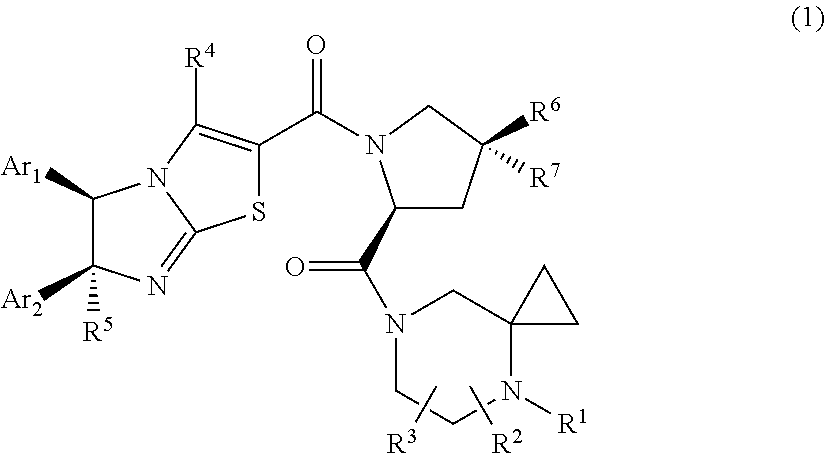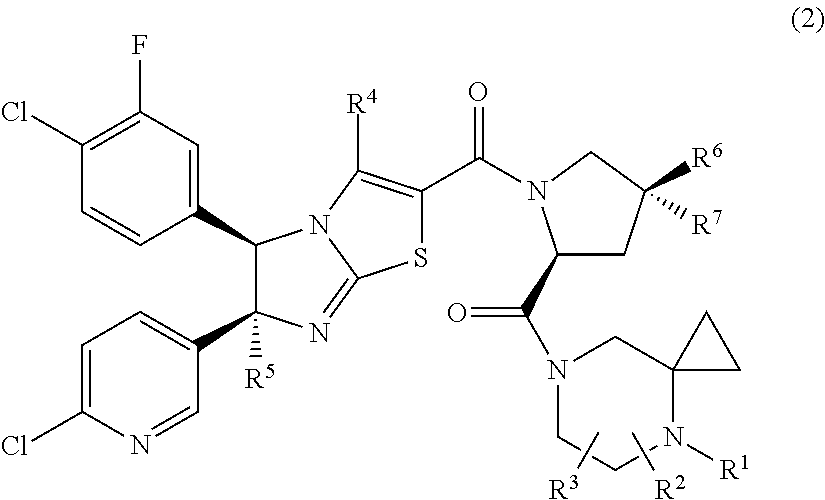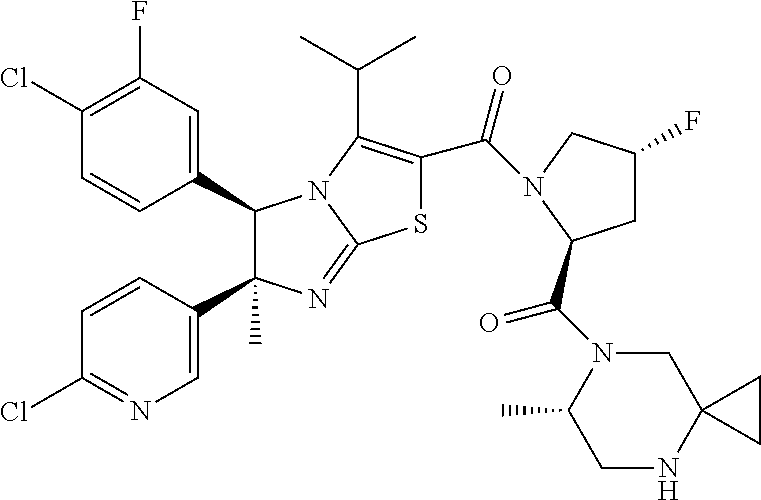Imidazothiazole derivatives having proline ring structure
a technology of imidazothiazole and proline ring structure, which is applied in the direction of organic chemistry, organic active ingredients, drug compositions, etc., can solve the problem that no report has shown that these compounds actually showed efficacy in clinical practi
- Summary
- Abstract
- Description
- Claims
- Application Information
AI Technical Summary
Benefits of technology
Problems solved by technology
Method used
Image
Examples
example 1
[0222]
Step 1: 7-[(4R)-1-{[(5R,6S)-5-(4-chloro-3-fluorophenyl)-6-(6-chloropyridin-3-yl)-3-isopropyl-6-methyl-5,6-dihydroimidazo[2,1-b][1,3]thiazol-2-yl]carbonyl}-4-fluoro-L-prolyl]-4-(trifluoroacetyl)-4,7-diazaspiro[2.5]octane
[0223]Thionyl chloride (0.50 ml) and dimethylformamide (2 drops) were added to a 1,2-dichloroethane (10 ml) suspension of the compound (470 mg, 1.00 mmol) obtained in Step 13 of Reference Example 1, the resulting mixture was stirred under heating at 70° C. for 1 hour and then the solvent was concentrated under reduced pressure. The residue obtained was dissolved in tetrahydrofuran (10 ml) and added dropwise to a tetrahydrofuran (10 ml) solution of the compound (380 mg, 1.20 mmol) obtained in Step 2 of Reference Example 3 and triethylamine (0.42 ml, 3.00 mmol) under ice cooling and the resulting mixture was stirred at room temperature for 20 hours. The reaction mixture was diluted with ethyl acetate and the organic layer was washed with saturated aqueous sodium b...
example 2
[0231]
Step 1: (6S)-7-[(4R)-1-{[(5R,6S)-5-(4-chloro-3-fluorophenyl)-6-(6-chloropyridin-3-yl)-3-isopropyl-6-methyl-5,6-dihydroimidazo[2,1-b][1,3]thiazol-2-yl]carbonyl}-4-fluoro-L-prolyl]-6-methyl-4-(trifluoroacetyl)-4,7-diazaspiro[2.5]octane
[0232]Triethylamine (0.12 ml, 0.86 mmol), 1-(3-dimethylaminopropyl)-3-ethylcarbodiimide hydrochloride (100 mg, 0.52 mmol), and 1-hydroxybenzotriazole (53 mg, 0.43 mmol) were added to a dimethylformamide (3 ml) solution of the compound (200 mg, 0.43 mmol) obtained in Step 13 of Reference Example 1 and the compound (159 mg, 0.47 mmol) obtained in Step 2 of Reference Example 5 and the resulting mixture was stirred at room temperature for 24 hours. The reaction mixture was diluted with ethyl acetate, washed with saturated aqueous sodium bicarbonate solution, water, and saturated brine, and then dried over anhydrous sodium sulfate. The solvent was evaporated under reduced pressure and the residue obtained was purified by silica gel column chromatography...
example 3
[0240]
Step 1: (6R)-7-[(4R)-1-{[(5R,6S)-5-(4-chloro-3-fluorophenyl)-6-(6-chloropyridin-3-yl)-3-isopropyl-6-methyl-5,6-dihydroimidazo[2,1-b][1,3]thiazol-2-yl]carbonyl}-4-fluoro-L-prolyl]-6-methyl-4-(trifluoroacetyl)-4,7-diazaspiro[2.5]octane
[0241]The compound obtained in Step 13 of Reference Example 1 was reacted in the same way as in Step 1 of Example 2 using the compound obtained in Step 2 of Reference Example 7 instead of the compound obtained in Step 2 of Reference Example 5 to give the title compound as a colorless solid.
[0242]1H-NMR (400 MHz, DMSO-d6, 100° C.) δ: 0.71-0.73 (1H, m), 0.89-0.92 (1H, m), 0.93 (6H, d, J=7.1 Hz), 1.10-1.13 (3H, m), 1.30-1.32 (1H, m), 1.47-1.49 (1H, m), 1.77 (3H, s), 2.06-2.08 (1H, m), 2.61-2.68 (1H, m), 3.51-3.54 (3H, m), 3.71-3.81 (1H, m), 3.90-3.95 (2H, m), 4.61 (1H, brs), 5.04 (1H, t, J=8.1 Hz), 5.34 (1H, d, J=54.0 Hz), 5.50 (1H, s), 6.74 (1H, d, J=7.8 Hz), 6.93 (1H, d, J=7.8 Hz), 7.16 (1H, dd, J=8.3, 0.7 Hz), 7.33 (1H, t, J=7.8 Hz), 7.64 (1H, dd, ...
PUM
| Property | Measurement | Unit |
|---|---|---|
| temperature | aaaaa | aaaaa |
| boiling point | aaaaa | aaaaa |
| temperature | aaaaa | aaaaa |
Abstract
Description
Claims
Application Information
 Login to View More
Login to View More - R&D
- Intellectual Property
- Life Sciences
- Materials
- Tech Scout
- Unparalleled Data Quality
- Higher Quality Content
- 60% Fewer Hallucinations
Browse by: Latest US Patents, China's latest patents, Technical Efficacy Thesaurus, Application Domain, Technology Topic, Popular Technical Reports.
© 2025 PatSnap. All rights reserved.Legal|Privacy policy|Modern Slavery Act Transparency Statement|Sitemap|About US| Contact US: help@patsnap.com



